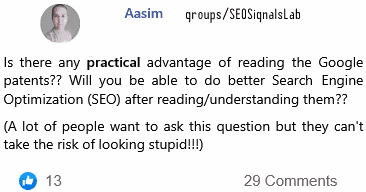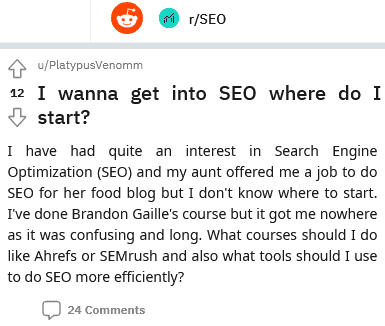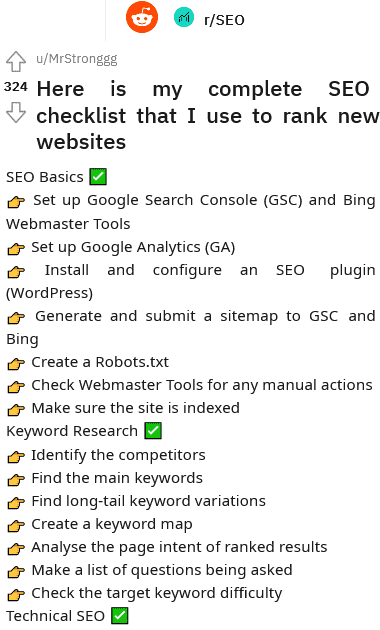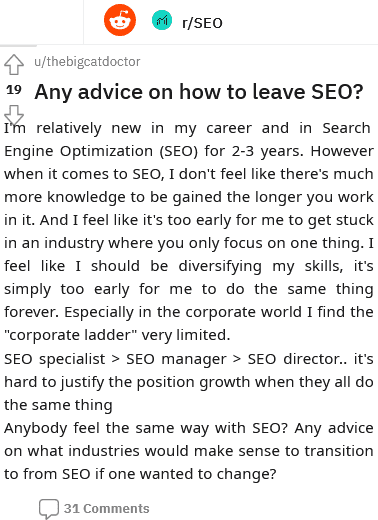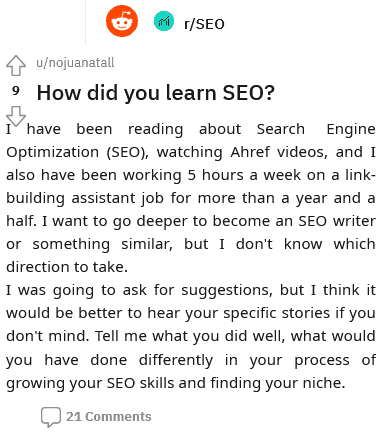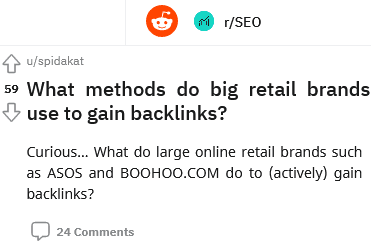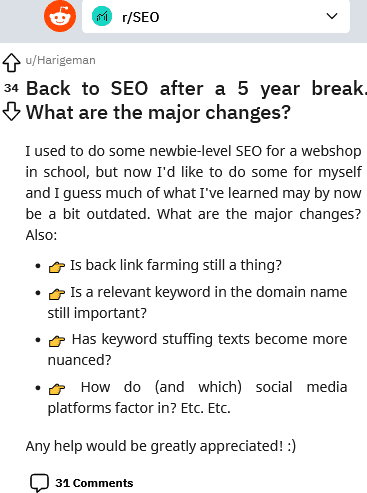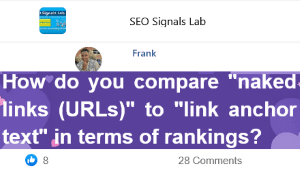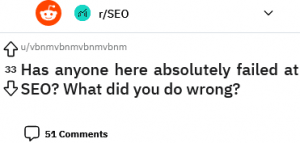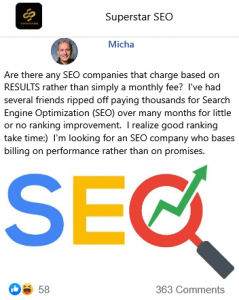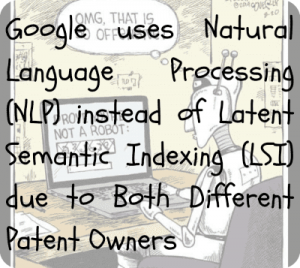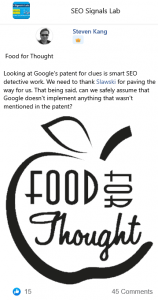Is there any practical advantage of reading the Google patents?? Will you be able to do better Search Engine Optimization (SEO) after reading/understanding them??
(A lot of people want to ask this question but they can't take the risk of looking stupid!!!)
13 👍🏽13
29 💬🗨
📰👈
Reading them – no. Understanding them – yes. And understanding them is hard. Bill (seobythesea.com) is probably the most known search patent researcher out there. I worked with him at a forum back when he was really just starting to pick apart patents as a hobby. There were several of us that would take a new patent and try to pick it apart and figure it out and it would often take days or even weeks to make sense of any of it. Bill has a background in the type of language used for these things. Over time we got better at it – and he got so good that he's well known for it. But it took a LONG time and a LOT of effort on his part to get there, I'm sure he'd agree.
So… the point is… it's not an easy road and why a lot of people don't focus a lot on it. Nowadays, we have the benefit of looking at his analysis that highlights the key points and explains them in more colloquial language – and that can often provide what you need without having to learn it. If it's something that interests you though – then sure! Spend the time and energy to learn. It's a lot of fun.
Now… the understanding part – and does it help? Absolutely. Keep in mind, though, that just because there's a patent in place – it doesn't mean that it's being used. It doesn't mean that that is the ONLY way they do it, and it doesn't mean that the technology hasn't evolved to do even more than what the patent describes.
What it helps you with is understanding what Google is trying to accomplish and then some methods they might use in order to accomplish that. As an SEO, that's useful. For example, with MUM and several other patents describing identifying things within images and other types of media besides just text – we can know that image optimization isn't just about taking some stock image and writing keywords in the alt text anymore. Image optimization is starting to require you to ACTUALLY have an image of what you're talking about – or something directly related to it. And, since we know that technology is new, it might also help us choose between two images to use that we're on the fence about. Does one of those images show the item in better detail or otherwise feature what we're talking about in a way that a machine might have an easier time actually identifying it? Then maybe THAT is the optimal image to use – even if the other one might be prettier.
So… understanding what Google is trying to do is important. As SEO users we can come up with techniques and things that we do which make it easier for Google to do what it's trying to do. And if we understand how Google might be trying to do that – then we can know the most effective way to execute our plan to make it easier for Google to do what they want to do. If we do that, then Google rewards us by knowing WHAT we are about and trying to do – and will show us to the people who are looking for someone who does what we do.
👍🏽21
📰👈
Thanks. Read your full comment. Bill is an authority, no doubt.
Marsh » Truslow
I just wrote the same comment, but it was a lot less helpful, and a lot less detailed, so I'm deleting it
🤭2
Truslow 🎓
I'm sure yours was good too – probably shorter. Saying the same thing but with fewer words is often a good thing. SEO taught me that. 😉
Ozaydin » Truslow
This could be a blog post 😎
Chris Edwards 🎓
By understanding patents, the actuality of them, and working out how you yourself would make use of the patent, you can get a better idea of what's coming over the hill, in short it helps you to future proof.
Ammon Johns 🎓
A lot depends on (a) which patent and (b) whether you actually understand it correctly. Many read things they never quite understand fully (or correctly), and of course that does no real good at all.
For an example, since I know people already have their camps, many years ago Page and Brin published patents on how PageRank works. It wasn't originally a Google patent, of course, but rather was published by Stanford where they both studied and used grant money to do their early academic work.
The *direct* result of that patent, and reading it, is companies such as Majestic, SEMrush, Moz, AHREFs, and so forth. Without that patent, none of those tools of link analysis would exist based on the clearly written and described processes (and math).
So, do you believe there was a practical advantage to being able to found companies like that with the success you can see for yourself, the people employed, etc.?
Garrett
I've followed something Truslow has said and it's helped me specifically with reading Bill breakdowns on his seobythesea site. I'll get in there and try to read it myself, then read Bill's breakdown, then go back and read it again. It is difficult for me and honestly, after that, I still don't understand a whole lot. But it becoming more clear each time I practice it and it definitely beats reading "Search Engine Optimization (SEO)" articles being pumped out pretty much saying the same thing but worded differently.
In a lot of ways it's like learning a new language. In some ways it actually IS learning to read a new language. When you first start – it's all Greek. But each time, you pick up a few more words and pretty soon you know how to understand bits and get the gist of it.
You might also read it again a few weeks later and pick up on new things – and find that something you read somewhere else in between sessions helps bring a bit of clarity to something that was foreign on the first few passes.
I'm not sure where Bill is now insofar as how long it takes him to really read and fully digest a patent. I know he describes it as "studying" them, not "reading" them – so that's probably a clue. I do remember a discussion in the olden days when we were looking at the Topic Sensitive PageRank patent and from when we first starting noting about it in the forum until the point we had discussed and read it enough times (with Bill doing a huge amount of fact checking and validating or denying much of the speculation I and others would make) it was close to two weeks before we had an outline that we figured was a fairly accurate assessment of it. I can't imagine it takes that long anymore (especially without jerks like me adding some speculation into the mix to distract him) but I bet it's rarely just one or two read throughs and he magically understands it.
Garrett
It's embarrassing to admit but when I'm reading those docs or other items out there written like this, I am pretty much looking up the definition of every other word and having to go back and re-read it sentence by sentence lol.
That does help me a lot actually with reading it and then coming back after a week or two. I mean just spending time in this group and reading what you guys post and discuss then going back to those patents is an eye-opener.
As far as the new or newer ones go, again, I really struggle with those and plus the addition of not knowing what it's specifically for, if it's going to happen, and I could be way off here but does Google ever release these to "trick" or stir the competition in a different direction?
But to your point, "jerks" like you ask the important questions and really help make sense of it all in a way the dummies like myself can understand and you guys write it out with actual examples.
Whelan » Garrett
Nothing embarrassing about it. At all.
Jackie
Besides just reading the patent, understanding them and test things yourself are more important. Some patents might not be used in the real world scenario, some are outdated, which in this case, I'd suggest looking into the research papers of modern search engine technologies as well, to see what's feasible, what's the current state-of-the-art. There aren't just web search engines. Then you'll see the pattern
What is PageRank? Is it the same as Backlink Juice or Link Equity? PageRank was a Patent Created by Google’s Founders
Doesn’t Google implement anything in SEO that wasn’t mentioned in the Patent?
Google uses Natural Language Processing (NLP) instead of Latent Semantic Indexing (LSI) due to Both Different Patent Owners
Can Content that gets Written by Artificial Intelligence (AI) Win In Google SERPs?
If You Feel Google Play Which SEO You Believe
The Google SEO Glossary
